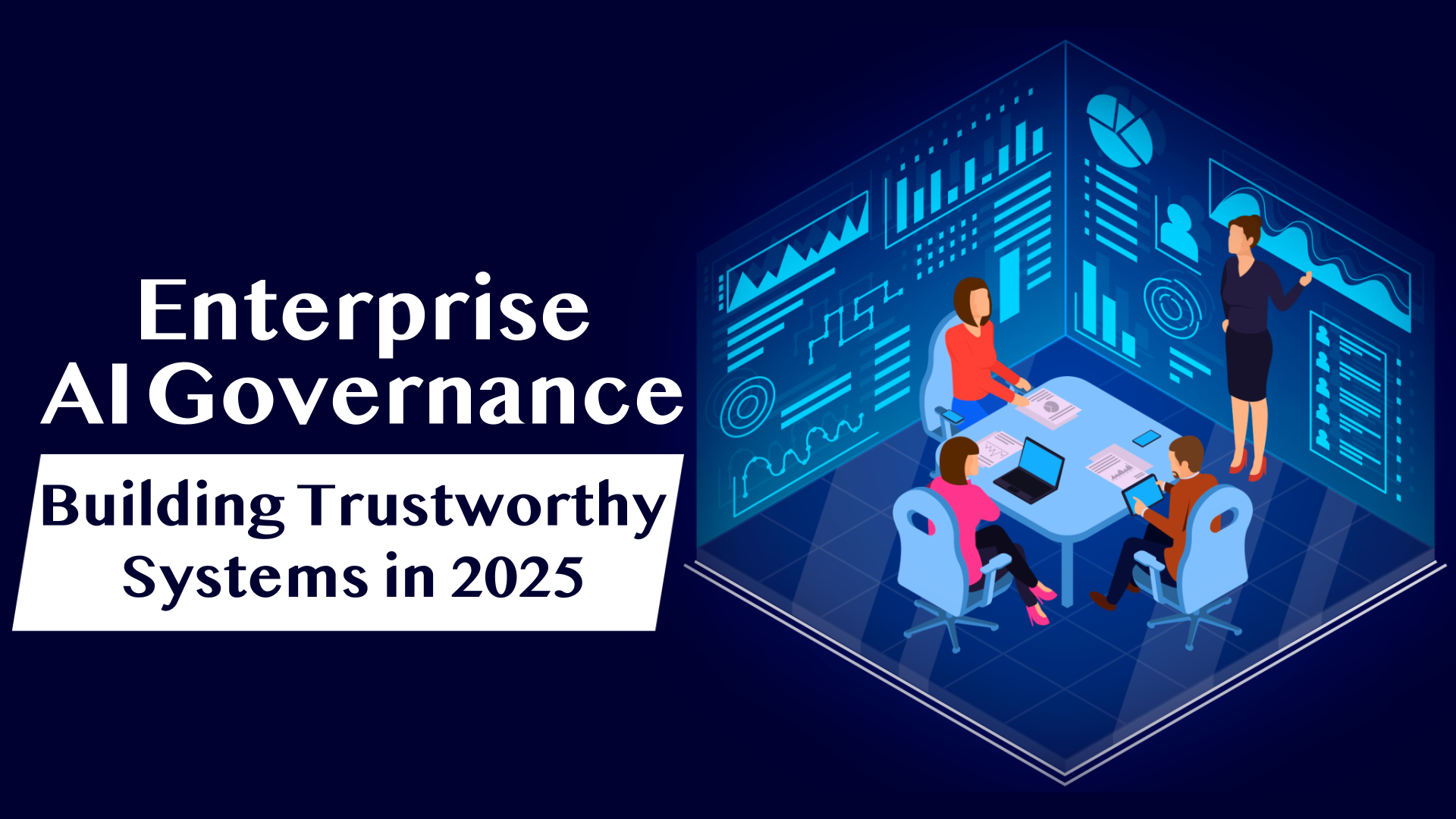
Enterprise AI Governance: Building Trustworthy Systems in 2025
- by Indu Sharma
In 2025, Artificial Intelligence (AI) continues to redefine business operations—from decision-making to customer interaction and supply chain optimization. But as enterprises rapidly scale their AI use, the need for AI governance in business becomes more urgent than ever. Ensuring transparency, accountability, and fairness in automated systems is no longer a choice—it’s a strategic necessity.
In this article, we explore the framework for responsible AI practices, the business case for robust governance, and how enterprises can implement AI governance systems that build trust, reduce risk, and drive long-term value.
What Is AI Governance in Business?
AI governance in business refers to the frameworks, policies, and practices that guide how AI systems are developed, deployed, and monitored. It ensures AI behaves ethically, complies with laws, and aligns with organizational values.
This involves:
-
Transparency in data usage and decision-making
-
Bias mitigation in algorithms
-
Explainability of AI outputs
-
Regular monitoring and auditing
-
Human oversight and accountability mechanisms
In essence, AI governance acts as the ethical backbone for enterprise AI systems—ensuring technology works for people and not against them.
Why AI Governance Matters in 2025
AI is now embedded in critical enterprise functions—automated lending decisions, healthcare diagnostics, recruitment algorithms, predictive maintenance, and even legal risk assessments. But as AI grows in power, so do its risks.
Key drivers of AI governance in business in 2025:
-
Regulatory Pressure – With global regulations like the EU AI Act and India’s Digital India Act, compliance is mandatory to avoid penalties.
-
Reputational Risk – Biased hiring algorithms or privacy violations can damage brand trust.
-
Stakeholder Trust – Customers, investors, and employees demand ethical technology.
-
Operational Reliability – Governance ensures AI is safe, secure, and aligned with business goals.
The Pillars of Responsible AI Practices
1. Fairness and Bias Mitigation
Bias in AI systems can reinforce inequalities.
Solutions: Bias audits, fairness-aware models, diverse datasets, cross-functional ethical reviews.
2. Transparency and Explainability
Stakeholders must understand AI-driven decisions.
Solutions: Interpretable models, audit trails, user-friendly explanations, tools like SHAP/LIME.
3. Privacy and Data Security
AI must respect user consent and data protection laws.
Solutions: Anonymization, federated learning, access controls, compliance frameworks.
4. Accountability and Human Oversight
AI must never operate without human accountability.
Solutions: Clear roles for oversight, escalation paths, ethics boards, human-in-the-loop systems.
5. Continuous Monitoring and Auditing
AI evolves — governance must keep up.
Solutions: Monitor model drift, schedule audits, validate outputs, maintain retraining logs.
Implementing AI Governance in the Enterprise
Step 1: Establish an AI Governance Framework
-
Ethical AI charter
-
Risk classification system
-
Compliance checklists
-
SOPs aligned with ISO/IEC 42001
Step 2: Build Cross-Functional Teams
Include IT, legal, compliance, HR, and product leaders. Assign roles like Chief AI Ethics Officer, Governance Committee, AI Champions.
Step 3: Classify AI Use Cases by Risk
-
High-risk: Credit scoring, healthcare, hiring
-
Medium-risk: Customer segmentation, pricing
-
Low-risk: Inventory forecasting, chatbots
Step 4: Embed Responsible AI in Development
Impact assessments, model cards, compliance reviews, and diverse test cases.
Best Practices:
- Conduct ethical impact assessments during design.
- Use model cards and datasheets for transparency.
- Involve compliance and ethics review before deployment.
- Test systems across edge cases and diverse user groups
Step 5: Invest in AI Governance Tools
Leverage technology to enforce governance at scale. Popular tools and platforms in 2025 include:
-
Microsoft Responsible AI Dashboard
-
IBM Watson OpenScale
-
Google’s What-If Tool
-
Fiddler AI for bias detection
-
Truera for model explainability
These platforms help enterprises monitor AI performance, detect bias, and log governance-related activities automatically.
Step 6: Educate and Train Employees
Governance is a cultural shift. Employees from data scientists to business heads must be trained on responsible AI. Key training topics include:
-
Ethics in AI design
-
Privacy and data security
-
Bias awareness
-
Regulatory compliance
-
Crisis handling in AI errors
Step 7: Communicate AI Ethics to Stakeholders
Transparency builds trust. Communicate your responsible AI journey with customers, partners, and regulators. Include this in:
-
ESG reports
-
Investor briefings
-
CSR communications
-
Product onboarding and documentation
Case Studies
-
TCS – Created an AI ethics charter and trained 50,000 employees.
-
HDFC Bank—Uses explainable AI under RBI oversight.
-
Microsoft—Applies Responsible AI Standard globally with monitoring tools.
Challenges in AI Governance
-
Lack of clear regulations in many countries
-
Skill gaps in ethics and compliance
-
Legacy systems unfit for governance
-
Cost of tools and training
Future Trends (2025–2030)
-
AI-specific audits will become mandatory
-
Synthetic data governance will grow
-
Automated ethics enforcement engines will rise
-
Industry associations will set AI governance templates
-
AI Governance-as-a-Service (AIGaaS) will emerge
Conclusion
In 2025, AI governance in business is no longer an academic discussion it’s a foundational pillar for
competitive advantage. By committing to responsible AI practices, enterprises ensure their systems
are not only intelligent but also ethical, transparent, and human-centric.
The companies that invest in AI governance today will lead tomorrow—not just in innovation, but in
trust.
FAQs
Q1. What is AI governance in business, and why is it important?
It refers to frameworks ensuring AI is ethical, legal, and aligned with company values—essential to avoid bias, privacy issues, and reputational damage.
Q2. How can businesses implement responsible AI practices?
By setting up governance teams, running audits, using bias detection tools, and ensuring accountability across the AI lifecycle.
Q3. Are there tools to support AI governance?
Yes. IBM Watson OpenScale, Microsoft’s Responsible AI Dashboard, Fiddler AI, and Truera are widely used.
In 2025, Artificial Intelligence (AI) continues to redefine business operations—from decision-making to customer interaction and supply chain optimization. But as…
